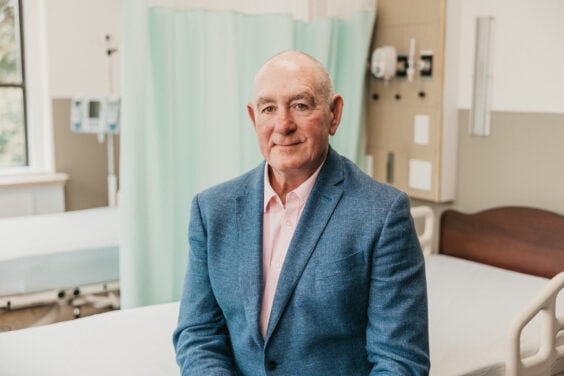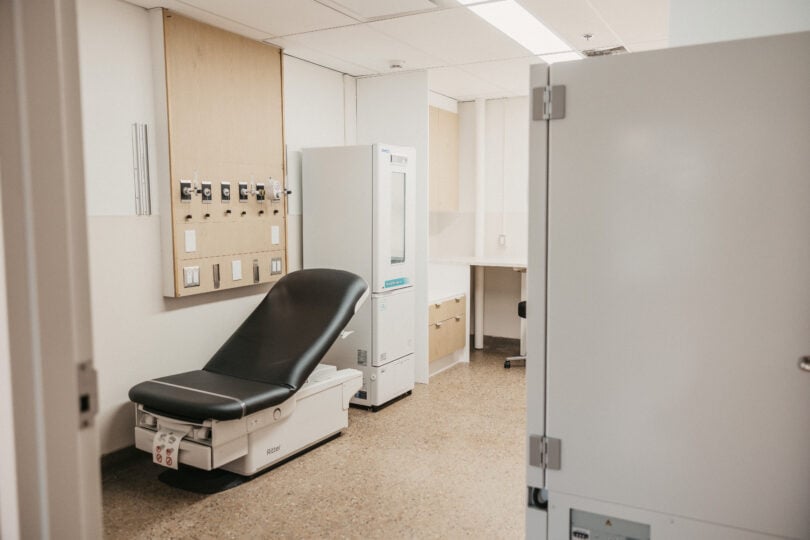Providence Health Care is now home to a new eight-bed Clinical Trials Unit (CTU) at Mount Saint Joseph Hospital in Vancouver.
The unit is the first of its kind in B.C. for non-cancer Phase 1 clinical trials. It will allow researchers to safely test new treatments on people for the first time, with full medical support.
What this new unit means for patients
The CTU gives patients in B.C. access to new medical devices and potential medicines sooner. These include things like antibody treatments, gene therapies and vaccines. People can now take part in trials before these treatments are widely available.
The unit also helps local companies keep their research here. That means more jobs and faster development of new medicines. It supports Providence Research and helps attract investment to fuel the growth of B.C.’s life-sciences sector.

Phase 1 clinical trials are the first step in testing new drugs or medical devices in humans. These trials focus on safety, side effects, and how the treatment should be given. They are done with healthy volunteers under close medical supervision.
If the results are promising, the treatment moves to later phases of testing. Phase II to IV trials involve more people and aim to get approval for the new drug from Health Canada.

Why this matters
“The impact of this clinical-trials unit on British Columbians cannot be understated,” said Darryl Knight, president, Providence Research, vice-president, research and academic affairs, Providence Health Care, Associate Dean of Research, Faculty of Medicine, UBC.
“The immediate benefit is provincial access to early-phase clinical trials which, up to now, has been missing. Phase 1 clinical trials conducted on healthy volunteers in the first instance are the gateway to Health Canada approval.
“Early access to new therapies translates into improved health outcomes for people in B.C. and tangible economic benefits for the province.”

What leaders are saying
Government and health leaders expect the new unit to attract more trials to the province. That means more treatment options sooner for B.C. patients and more funding for the life-sciences sector.
“The new Clinical Trials Unit will drive the development of cutting-edge therapies and give B.C. life-sciences companies a clear pathway from invention to final approval,” said Josie Osborne, Minister of Health.
“Until now, Phase 1 clinical trials for non-oncology conditions weren’t possible in B.C. With the opening of the CTU, we can now support every stage of therapy development, benefiting patients, strengthening B.C. companies and growing our economy.”
What’s changing in B.C. health research
Successful Phase 1 clinical trials can lead to high-value licensing agreements with global pharmaceutical companies. That brings more money to B.C. and helps local companies grow.
“Enhancing capacity for Phase 1 trials will increase the global competitiveness of British Columbia’s clinical trials ecosystem,” said Danielle Lavallee, vice-president, research programs, Michael Smith Health Research BC. “This crucial investment supports B.C.’s vision for clinical trials in which health and economic benefits are maximized for British Columbians.”
The CTU is part of a larger provincial strategy to grow B.C.’s life sciences and biomanufacturing industries. Announced in 2023, the Province invested more than $4 million to create the CTU. Michael Smith Health Research BC, B.C.’s health research agency, contributed $1.2 million to further strengthen the province’s clinical trials environment, including $600,000 to the CTU and $600,000 to support a professorship at the University of British Columbia. That person will serve as the unit’s chief medical officer.
Quick facts:
- All studies conducted at the new CTU must have approval from Health Canada to proceed.
- Studies must also receive approval from the Providence Health Care Research Ethics Board and Providence Health Care prior to initiation of study activity.
- Eight participants at a time can participate in any ongoing trial.
- Volunteers can sign up for any future studies through REACHBC.
- Clinical Trials BC, part of Health Research BC, is providing regulatory compliance consultation, training, and digital platforms to support the quality and efficiency of trials based at the new unit.
- There are more than 2,000 life-sciences companies employing close to 20,000 people in the B.C.
This story was adapted from a Government of BC news release.





